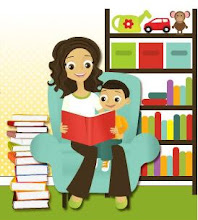There are a couple of schools of thought when it comes to what books boys (or children in general) should read. Some folks say that books like the Goosebumps series or other similarly "yucky" books are inappropriate and should not be encouraged. Others say if boys are reading...let them read WHATEVER will interest them.
My personal opinion is that the answer lies somewhere in the middle. If you have a reluctant reader and he will not read anything other than these types of books, I say some reading is better than NO reading at all. But I think parents should read the books that they are giving to their children so that they can have discussions about the content. If the book has all of the makings of a good literacy experience, then it's probably worth reading.
As teachers however, we have to have a standard that is acceptable to all parents and some books that parents might choose to read at home, are not necessarily appropriate for school. Generally we early childhood educators have it easier than our elementary school counterparts. In preschool and kindergarten, most young boys haven't yet developed the gross sense of humor that will make moms and teachers cringe :). But for older boys, if they are reading books about slimy monsters AND they are learning to comprehend, decipher new words, spell, process information, imagine the unthinkable, and learn to differentiate between reality and fantasy, then it's fine with me! Now, certainly if that's all a boy wants to read, it's our job as adults to make an effort to find other subjects that will peek his interest. But again I say, some reading is better than NO reading!
On a side note, I think it's important that we not ASSUME that because a child is a BOY then he will automatically like these types of books. My only point here is if you have a boy who is drawn to these types of books, I don't think it's the end of the world :).
Here are two links that present differing points of view:
- Getting Boys to Read: Boys and Gross Humor
- How to Raise Boys Who Read; Hint: Not with gross-out books and video-game bribes
What do you think about the yuck factor? Yes or No?
Related Posts:
- Six Not-So-Secret Tips for Encouraging Literacy Development in Boys
- Teacher Tip Tuesday: Tip #4: Boys and Books in the Classroom
- Beyond Reading: 15 Literacy Activities for Parents with Boys
- 25 Books Boys (and girls) Might Enjoy (coming soon)
- Literacy Challenges for “at-risk” families (coming soon)

























I am female and I have always been a reader. I still love reading to this day. I loved reading Goosebump books when I was a little girl (I was a kid when the first book came out). Basically, I am trying to say that letting children read "popular" books is not necessarily going to turn them off from reading anything else.
ReplyDeleteThanks for your comment April. I must say, I do agree with you!
ReplyDeleteI agree that the parent should preview the book first and decide if it works for them. I also agree that I might not be appropriate for a teacher to recommend a book to a child that fits under the "yuck factor" because it might not jive with the parent's expectations of proper behavior.
ReplyDeleteI have 2 boys. They are both still really little.But they already subscribe to the "yuck factor". I don't think we're teaching them anything new by letting them read those books. We're just meeting them at an area that, oddly, interests them.
Good post!
As a parent and teacher I say that reading is reading.
ReplyDeleteI think that all books can be a way to engage discussion and teach children. Perhaps some books might wait until a different age but to stop children from reading books they want to read, I'd strongly suggest thinking twice about it. Choice is so motivating for kids when it comes to reading and to learning. Allow the choice, even if you don't like it. Then discuss - ask them what they thought, share your thoughts! Read it together if you can!
Thanks Jackie and Melissa! You both made excellent points...and it is really important that children have choices. It's up to us to be aware of what is in these books and to be available to discuss these topics with the children.
ReplyDelete